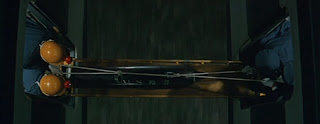aka SHINKANSEN DAIBAKUHA
Directed by Junya Sato
A trio of despondent revolutionaries led by Tetsuo Okita have planted a bomb somewhere aboard Hikari 109 threatening that the device will detonate should the train drop below 45 mph. Tetsuo demands a ransom of 5 million in US dollars be paid in exactly 70 minutes which means Hikari 109 will not be able to stop anywhere. Amidst scrambling to avoid collisions with other trains, derailment and other assorted perils, Aoki, the trains conductor, attempts to keep the passengers calm while the police frantically search for both the terrorists and the location of the bomb.
Directed by Junya Sato
A trio of despondent revolutionaries led by Tetsuo Okita have planted a bomb somewhere aboard Hikari 109 threatening that the device will detonate should the train drop below 45 mph. Tetsuo demands a ransom of 5 million in US dollars be paid in exactly 70 minutes which means Hikari 109 will not be able to stop anywhere. Amidst scrambling to avoid collisions with other trains, derailment and other assorted perils, Aoki, the trains conductor, attempts to keep the passengers calm while the police frantically search for both the terrorists and the location of the bomb.

This mid 70s Japanese disaster-crime movie from Toei Studios and director Junya Sato was obviously the template for the more widely known and inferior American production known as SPEED (1994) starring Keannu Reeves and Sandra Bullock. Whereas that films lead villain was a psychotic stand up comedian played by Dennis Hopper, BULLET TRAIN's Tetsuo is played with solemn perfection by famed actor Ken Takakura. The main villain here does not wish to hurt anyone and the way the film plays out the criminals are drawn as unusually sympathetic; a scripting contrivance almost completely lost in the streamlined international release that was shorn of forty minutes. Some of this scissored away footage entails the paranoia aboard the train by frantic passengers including a pregnant woman about to give birth.

The longer and far more polished Japanese version goes to great lengths to make its "villains" multi-layered individuals. If that weren't curious enough, the script counter-balances the criminals and cops blurring the line between both sides perceived "duty" to either public safety, or a reactionary vendetta resulting from a crippled economy. The passengers and crew aboard Hikari 109 are the cards with which these "good guys" and "bad guys" are playing with.

In accordance with the conventions of the 'Disaster Movie', there's a sampling of big names including Sonny Chiba as Aoki the train conductor and Takashi Shimura (the professor from GODZILLA) as the President of Japan National Railways. Other stars include a riveting performance by Ken Utsui (formerly of the lively STARMAN series) and a role by the distinguished Tetsuro Tamba as the Chief Detective of the National Police. The script consistently finds ways to implement action and suspense every few minutes as well as creating several cruel instances of karmic tragedy during the desperate chase to capture the terrorists as well as find and defuse the bomb.

Almost episodic in structure, the film flip flops between the perilous situation aboard Hikari 109 and the search for the crooks. While the script paints semi-stoic bad guys, the police and government officials are a bit on the duplicitous side. There's political intrigue and even media manipulation on hand. At one point, the idea of sacrificing the 1,500 passengers is bandied about in order to avert an even bigger disaster ("The needs of the many outweigh the needs of the few"). Towards the end, dishonorable tactics are utilized in a last ditch attempt to snare Tetsuo Okita before he makes off with his millions. Interestingly enough the fusion of empathetic criminals bearing detailed backgrounds was showcased in the Shaw Brothers production THE BIG HOLD-UP released the same year.

Hardcore action fans will likely be a bit bored here especially considering that major league martial arts star Sonny Chiba isn't the main attraction. In its unexpurgated release, this is Takakura's show while the international print edits many of his scenes giving the film more of an ensemble feel. BULLET TRAIN is nonetheless an intriguing ride with a lot of cliffhanger moments and some engrossing plot elements spread throughout the films 155 minute running time. The shorter 115 minute version also wreaks havoc with the pathos garnered in the longer Japanese version rendering some of the film incoherent. This was typical treatment of foreign films with an expansive running time. In both versions, the accent is on suspense as opposed to large scale calamity and destruction. This frequency of tense moments will likely satisfy thriller fans, but frustrate action buffs. A taut, exceedingly well made motion picture, Sato's film is for die hard crime-disaster movie and Chiba-Takakura fans.


No comments:
Post a Comment